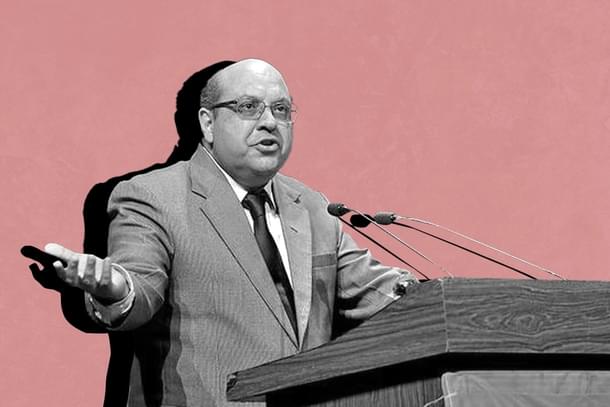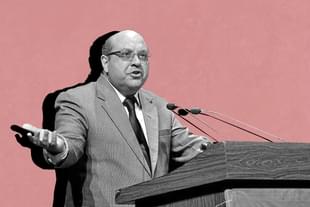Commentary
Unpacking Justice Nariman’s Post-Retirement Bias: More Than Just a Legal Critique?
Swarajya Staff
Dec 12, 2024, 08:36 PM | Updated 08:36 PM IST
Save & read from anywhere!
Bookmark stories for easy access on any device or the Swarajya app.


Recently, Justice (retd) Rohinton Fali Nariman, who spoke at an event in New Delhi, declared the 2019 Ayodhya verdict to be ‘a travesty of Justice’. He stated that a suitable reparation would have been the rebuilding of the disputed structure post its demolition and even declared the part of the judgement that placed emphasis on the finality of the Places of Worship (Special Provisions) Act 1991 to be the only silver lining.
His strong remarks sparked a mixed response. Some hailed his critique as a bold and necessary stand, while others questioned its sincerity, pointing out that during his tenure as a Supreme Court Justice, Justice Nariman had recused himself from hearing any cases related to the Ayodhya dispute.(read more here)
Rohinton Fali Nariman, often referred to as a "renaissance man," has had a distinguished career. He began as a Senior Advocate at the Bombay High Court, became Solicitor General, and later became only the fifth lawyer in India’s history to be directly elevated to the Supreme Court as a judge. Since his retirement in 2021, he has made numerous public speeches, frequently critiquing both the ruling government and judgements made by the apex court itself.
From the Sabarimala verdict to profuse praise for Babar, here is a chronicle of all the times the former Justice went no holds barred -
1. Ban on the BBC
Speaking at the inaugural Jitendra Desai Memorial Lecture in Ahmedabad on "Freedom of Speech: Contemporary Challenges," Justice Nariman described the Centre's ban on the BBC documentary about Prime Minister Narendra Modi as "futile, unfortunate, and coercive."
While arguments can be made with regards to the freedoms of speech and press under Article 19, it is questionable if such freedoms extend to blatant misrepresentation.
Justice Nariman’s stance overlooked concerns about the documentary's accuracy and potential slander against India's democracy. A detailed breakdown of the same can be found here.
2. Article 370- A Matter of Regret
Both Justice Nariman and his distinguished father - Advocate Fali S Nariman were in disagreement with the Supreme Court’s verdict upholding the amendment of Article 370.
Advocate Nariman’s disagreement was largely constitutional and he proposed that a better method to amend the article would have been to take the route of a constitutional amendment under Article 368. While he disagreed with the way it was done, he did acknowledge the political prudence behind the amendment.
Justice Nariman was more dramatic in his description - ‘very very disturbing feature’ is what he termed the legislative action.
His primary contention was that the centre enacted the amendment and created two new Union territories despite already imposing President’s rule in the state under Article 356. This was done, he said, in order to bypass the two conditions imposed by the same Article i.e. the periodic extension on a yearly basis can only be done either upon a declaration of national emergency or if the election commission attests to the non-feasibility of conduct of elections in the state.
While the debate over the best manner of bringing forth the amendment can be accommodated for academic purposes what his critique perhaps overlooks is the broader need for the temporary provisions of Article 370 to be done away with in the interest of India's sovereignty.
The principle remains that the territorial integrity or the continued existence of any state is not guaranteed by the Constitution. In fact, Article 3 specifically allows the Parliament to redraw the political map of India according to its will. As Dr B.R Ambedkar himself once said- 'India is an indestructible Union of destructible states’.
3. A Governor’s Discretion
Amidst the standoff between the Kerala Governor Arif Mohammad Khan and the state government over the pocket veto exercised by the former over three Bills, Justice Nariman had this to say -
I am waiting for the day when the Supreme Court will lay down that it is only independent functionaries who are supposed to fill these great offices. Not the kind of people that we find today, like we have in Kerala, for example.
It must be noted that Article 201 of the Constitution empowers the Governor to practice his discretion and exercise such pocket veto. On similar lines, the apex court itself in BK Pavitra V The Union of India has held that there is no constraint on the Governor to refer a bill to the President (another verdict that Justice Nariman termed as ‘unfortunate’)
4. The ‘Tolerant Babar’
Justice Nariman in a keynote address on "Constitutional Underpinnings of the Rule of Law" at the inauguration of D.M. Harish School of Law, read a letter from Babar to Humayun, where the latter advised his son to administer justice fairly across different communities and to avoid cow slaughter. Justice Nariman termed the letter beautiful and said Babar's grandson carried all this into practice.
Choosing to selectively highlight this letter is reductionist. Babar is said to have committed spine-chilling atrocities against Hindus. For instance, Arun Shourie in his book Eminent Historians: Their Technology, Their Line, Their Fraud, translates Guru Nanak Dev ji’s lament in the Babar Bani of the Sri Guru Granth Sahib as thus:
"Ikna vakhat khuvai ahi ikhan pooja jayi
Chadke vindu hindvandiyan kiyu tike kathi nayi
Ramu na kabhu chetiyo hundi kahndi na mile khudai..."
Translation: Hindus have been forbidden to pray at the time of the Muslim's namaz, Hindu society has been left without a bath, without a tilak. Even those who have never uttered "Ram", even they can get no respite by shouting "Khuda, Khuda".... The few who have survived Babar's jails wail.... The desolation which has come over the land.... The entire races which have been exterminated, which have been humiliated...
5. The Sabarimala Issue
Justice Nariman was part of the Constitutional bench which upheld that women (menstruating or otherwise) have the fundamental right under Article 14 (right to equality) to enter the Ayappan temple as the Sabarimala Temple’s denominational freedom under Article 26 is subject to the State’s social reform mandate under Article 25(2)(b).
Later, when the review petition on the same was accepted by the Supreme Court, and the matter was sent to a nine judge bench, the Justice had this to say -
Most unfortunately the Supreme Court itself sent this judgment by way of review petition-something unheard of-to a bench of nine judges to decide along with other matters and thereby Sabarimla now has gone into limbo
It would be worthy to note here that the said review when called upon for consideration would also address issues pertaining to the rights of Parsi women to enter the Fire temple after marrying non-Parsi men along with the right of menstruating Parsi women to enter Parsi places of worship.
Both issues are very similar to the one dealt by the Justice in the Sabarimala case. Moreover, the Justice himself is an ordained Parsi priest.
Additionally, he has claimed that the study of comparative religion has helped him become both a better Judge and Lawyer. Therefore, his silence over matters that could lead to the assessment of the practices of his own community using a similar yardstick as Sabarimala was intriguing indeed.
6. On Hate Speech
Justice Nariman while advocating for stricter laws against hate speech had this to say while deploring the alleged silence of the ruling party qua hate speeches:
We also have unfortunately other higher echelons of the ruling party not only being silent qua hate speech but almost endorsing it. We heard the other day from the very head of the ruling party a juxtaposition of a Mughal emperor known for being a bigot, namely, Aurangzeb as against Shivaji who was known to be a secular leader…
While the Justice did not explicitly mention the leader in question it should be noted that Prime Minister Modi made a similar juxtaposition at the inauguration of Kashi Vishwanath Dham at Varanasi, where he stated- 'if there is an Aurangzeb, Shivaji is also there'.
This rather innocuous statement of fact by the Prime Minister is perhaps not the best example of what should constitute 'hate speech'. Particularly when certain leaders have made truly incendiary comments that warrant greater attention- Akbaruddin Owaisi's speech in 2012 comes to mind.
Justice Rohinton Fali Nariman has had an illustrious career, with his judgment in the Shreya Singhal case being a landmark contribution to the protection of freedom of expression on the internet. By pioneering the principle of "manifest arbitrariness" and declaring instant triple talaq unconstitutional, he also played a crucial role in empowering millions of Muslim women in India.
He has also been part of landmark judgements such as the Puttaswamy case (right to privacy), the special bench that passed orders that lead to the publication of the final NRC in Assam and the decriminalisation of Section 377 amongst many others.
Having blazed such a trail of brilliance, it is puzzling why Justice Nariman, post-retirement, seems intent on taking heavily biased positions. His critiques, though thought-provoking, seem to reveal a more partisan and selective approach to justice. This departure from his earlier impartiality complicates his legacy.





